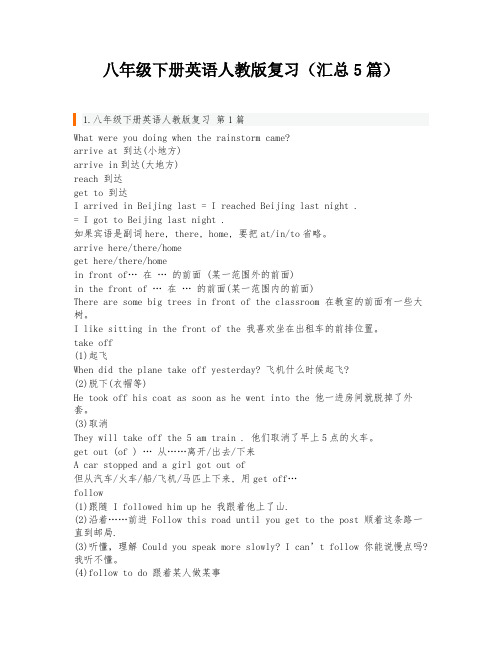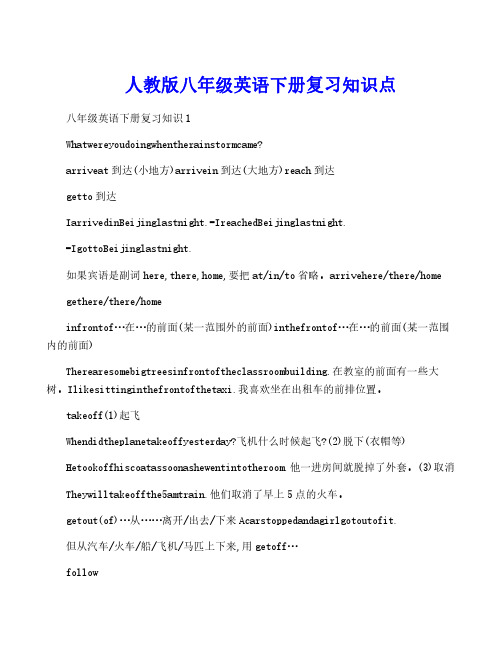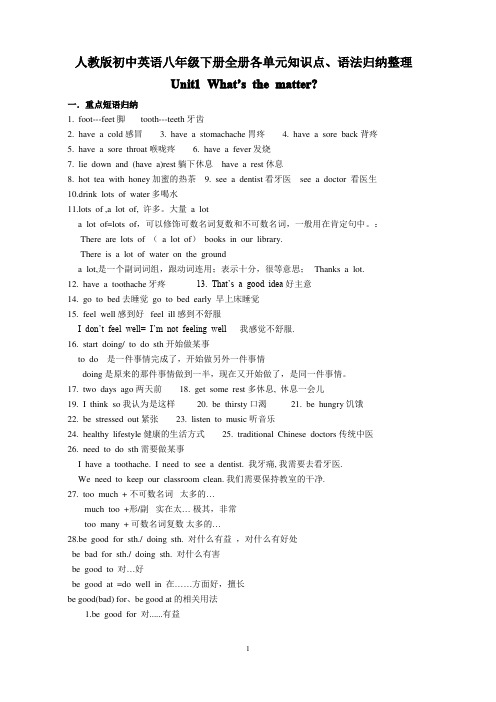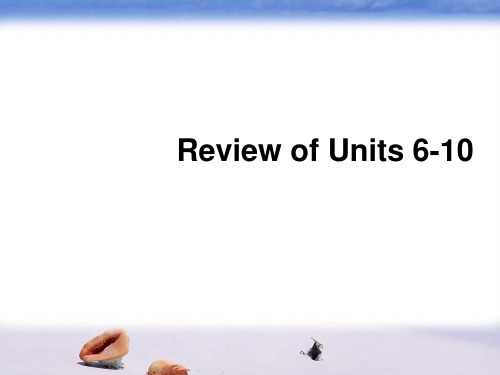最新人教版八年级英语下册复习全册
八年级下册英语人教版复习(汇总5篇)

八年级下册英语人教版复习(汇总5篇)1.八年级下册英语人教版复习第1篇What were you doing when the rainstorm came?arrive at 到达(小地方)arrive in到达(大地方)reach 到达get to 到达I arrived in Beijing last = I reached Beijing last night .= I got to Beijing last night .如果宾语是副词here, there, home, 要把at/in/to省略。
arrive here/there/homeget here/there/homein front of… 在… 的前面 (某一范围外的前面)in the front of … 在… 的前面(某一范围内的前面)There are some big trees in front of the classroom 在教室的前面有一些大树。
I like sitting in the front of the 我喜欢坐在出租车的前排位置。
take off(1)起飞When did the plane take off yesterday? 飞机什么时候起飞?(2)脱下(衣帽等)He took off his coat as soon as he went into the 他一进房间就脱掉了外套。
(3)取消They will take off the 5 am train . 他们取消了早上5点的火车。
get out (of ) … 从……离开/出去/下来A car stopped and a girl got out of但从汽车/火车/船/飞机/马匹上下来, 用get off…follow(1)跟随 I followed him up he 我跟着他上了山.(2)沿着……前进 Follow this road until you get to the post 顺着这条路一直到邮局.(3)听懂,理解Could you speak more slowly? I can’t follow 你能说慢点吗?我听不懂。
人教版八年级英语下册复习知识点

人教版八年级英语下册复习知识点八年级英语下册复习知识1Whatwereyoudoingwhentherainstormcame?arriveat到达(小地方)arrivein到达(大地方)reach到达getto到达IarrivedinBeijinglastnight.=IreachedBeijinglastnight.=IgottoBeijinglastnight.如果宾语是副词here,there,home,要把at/in/to省略。
arrivehere/there/homegethere/there/homeinfrontof…在…的前面(某一范围外的前面)inthefrontof…在…的前面(某一范围内的前面)Therearesomebigtreesinfrontoftheclassroombuilding.在教室的前面有一些大树。
Ilikesittinginthefrontofthetaxi.我喜欢坐在出租车的前排位置。
takeoff(1)起飞Whendidtheplanetakeoffyesterday?飞机什么时候起飞?(2)脱下(衣帽等)Hetookoffhiscoatassoonashewentintotheroom.他一进房间就脱掉了外套。
(3)取消Theywilltakeoffthe5amtrain.他们取消了早上5点的火车。
getout(of)…从……离开/出去/下来Acarstoppedandagirlgotoutofit.但从汽车/火车/船/飞机/马匹上下来,用getoff…follow跟随Ifollowedhimuphehill.我跟着他上了山.沿着……前进Followthisroaduntilyougettothepostoffice.顺着这条路一直到邮局.(3)听懂,理解Couldyouspeakmoreslowly?Ican’tfollowyou.你能说慢点吗?我听不(4)followsb.todosth.跟着某人做某事Pleasefollowmetoreadthestory.请跟我读这个。
人教版八年级英语下册各单元复习课件(全册-共925张PPT)

基础复现天天练
Work seriously
This morning I got a piece of bad news from QQ.An unlucky__1__ from Fujian died because she didn’t get help in time① when she traveled in Beijing. On April 18th, 2015, the woman took a visit to the Great Wall __2__ a group of friends.But she got lost with her friends later.Then she went to the foot of the Great Wall by __3__.Because it was sunny
重点短语
Work seriously
8.There were many times when Aron almost lost his life because of accidents. 有很多次阿伦因为意外几乎丧命。 9.This means being in a difficult situation that you cannot seem to get out of. 那意味着你陷入一个看起来无法逃脱的困境。
(完整版)最新人教版八年级下册英语全册知识点大全

最新人教版八年级下册英语全册知识点大全Unit 1重点短语:have a stomachache have a cold lie downtake one’s temperature have a fever go to a doctorto one’s surprise agree to (do sth.)get into troublebe used to take risks run out (of)cut off get out of be in control ofkeep on ( doing sth.)give up语言知识归纳:1. What’s the matter (w ith you)?此句用来询问别人的病情。
类似的句子还有:What’s wrong with you?/ What’s the trouble?matter作动词用,意为“要紧”“有关系”,主要用于疑问句和否定句。
What does it matter? It doesn’t matter.【例题】Does it ________ if we can’t finish it today?A. mindB. mindsC. matterD. matters2. I have a sore throat.have “患病”,常用“have a /an+ 名词”.have a cold have a fever have a sore backhave a stomachache have a cough【例题】( )---Does he often have ______ cold? ---Yes. He also _____a cough and a sore throat.A. a; hasB. /; hasC. a; haveD. /; have3.Lie down and rest! 躺下休息lie down 躺下4.That’s probably why. 那可能就是原因。
最全面人教版八年级下册英语各单元知识点总复习归纳总结

最全面人教版八年级下册英语各单元知识点总复习归纳总结Unit 1 How often do you exercise?词汇1. frequently 经常地2. hardly 几乎不3. ever 曾经4. once in a while 时不时5. rarely 很少语法一般现在时1. 频率副词放在动词前:I always read newspapers.2. 否定句用don't或doesn't+动词原形:I don't watch TV every day.3. 疑问句用do或does+主语+动词原形:Do you play soccer every week?Unit 2 I used to be afraid of the dark.词汇1. used to 过去常常2. get over 克服3. nervous 紧张的4. confident 有信心的5. stage 舞台语法1. Be used to+动名词表示惯或适应,I am used to studying English at night.2. Used to+动词原形表示过去常常,I used to read books every day.3. Get over+名词/代词/动名词,表示克服,She got over the flu last week.Unit 3 Could you please tell me where the restaurants are?词汇1. instruction 说明2. turn right/left 向右/左转3. excuse me 对不起4. straight 直走5. opposite 对面语法1. Could you please/could/may I+动词原形,请求礼貌地做事,Could you please help me with my English?2. Would like+名词 / 动名词,表示想要做某事,I would like to go shopping with you.3. May I ask+句子,礼貌地询问某事,May I ask where the restroom is?Unit 4 Why don't you talk to your parents?词汇1. conversation 对话2. listener 听众3. honest 诚实的4. conversation starter 聊天开场白5. effective 有效的语法1. How about/What about+动名词/名词,表示建议和提议,What about watching a movie?2. Why not+动词原形,表示建议和提议,Why not go swimming?3. Let's+动词原形,表示建议和提议,Let's have a party on the weekend.Unit 5 It must belong to Carla.词汇1. sweater 毛衣2. by accident 偶然地3. honest 诚实的4. lose 丢失5. owner 拥有者语法1. Can/Can't+动词原形,表示能力或可能性,I can dance.2. Must/Mustn't+动词原形,表示肯定或否定的推断,She must be the new teacher.3. Have/Has to+动词原形,表示必须做的事情,I have to finish my homework first.词汇1. graduate 毕业生2. physics 物理学3. ambitious 有抱负的4. career 职业5. education 教育语法一般将来时1. be going to+动词原形,表示打算做某事,I am going to see a film tonight.3. be + going to+现在进行时,表示不久会发生的事情,They are going to sing a song later.Unit 7 How do you make a banana milk shake?词汇1. recipe 食谱2. whip 打(奶油)3. peel 去皮4. slice 切片5. pour 倒语法1. What/How/Which+系动词+主语+谓语,表示特定的主语或具体的内容。
人教版英语八年级下册全册复习课件

cold
have a ____
stomachache
have a ____________
lie __d_ow__n
have a _f_e_v_e_r
get __o_ff
up
give ___
off
put ___
for
care ___
9. 赠送; 捐赠 10. 修理; 装饰 11. 建立; 设立 12. make a difference 13. take one’s temperature 14. take breaks 15. to one’s surprise 16. right away 17. get into
【归纳拓展】
【练一练 走近中考】
(2014·江西中考)—Hi, John. __________?
—It’s Lucy, my dog. Her leg is hurt.
A. How are you
B. What’s the matter
C. Who’s that
D. What’s Lucy like
“荒凉的; 偏僻的; 人迹罕至的”, 修饰表示地点 的名词, 只能作定语
【一言辨异】
I was travelling alone in the lonely mountain. I didn’t feel lonely though I was alone. 我独自在荒凉的山里旅行。虽孤身一人, 但我并不感到寂寞。
【练一练 走近中考】
(安顺中考)His grandparents live ______in a small house, but
they don’t feel______.
A. lonely; alone
初中英语 人教版八年级下册期末总复习(讲练+习题含答案,共104张PPT)

3. I think there will be more / less pollution. 我认为将会有更多/更少的污染。
fewer与less及more表数量的用法。
(3)many“许多”,修饰可数名词。 much“许多”,修饰不可数名词。
many / much比较级、最高级为不规则变化:many / much-more-most
“a few”表示“一些”+可数名词
例:a few days ago, for a few weeks, He has few friends here. There will be fewer trees.
3. I think there will be more / less pollution. 我认为将会有更多/更少的污染。
He went home after two days. 他两天后回家了。 Three years later,she had a baby. 三年后,她生了一个婴儿。
fall in love with 爱上… fall in love with a girl 爱上一个女孩 fall in love with a country 爱上一个国家
例:I have many magazines. She has more magazines. But he has the most. There will be more people on the earth in future. More and more students start to exercise more every day to keep fit.
典例展示 2.About Pollution
Tina: There is much pollution around us.
人教版八年级英语下册知识点全总结

人教版最新八年级英语下册知识点全总结!Unit1 what' s the matter?1. It’s +形容词 + for sb. + to do sth. 做某事对某人来说是…的。
It’s important to do sth. 做某事很重要。
It’s important for me to eat a balanced diet. 平衡饮食对我来说是很重要的.It’s easy to do sth. 做某事是容易的。
It’s easy for us to find out the answer. 找出答案对我们来说是容易的。
2. 情态动词should的用法should是情态动词,它的基本用法是必须和其他动词一起构成谓语。
意为"应该......"。
should(应当,应该)用于所有人称,表示劝告或建议。
eg. ---I have a very bad cold. 我感冒很厉害。
---You should lie down and have a rest. 你应该躺下,多喝水。
3. maybe与may be(1)maybe是副词,译为“也许、可能”,相当于“perhaps”。
如:Maybe he can answer the question. 也许他能回答那个问题。
He maybe is from the USA, too. 他可能也来自美国。
(2)may be中的may为情态动词,译为“可能是......”。
如:He may be from the USA, too. 他可能也来自美国。
She may be our English teacher. 她可能是我们的英语老师。
4. few、a few、little、a little的区别和联系:(1)few / a few用来修饰可数名词,few表示否定意义,没有,几乎没有;a few 表示肯定意义,有几个。
例如:He has few friends here, he feels lonely. 他这里没朋友,他感觉寂寞。
新目标人教版初中英语八年级下册总复习全套资料

初中英语总复习新目标人教版初中英语八年级下册第 1 讲 Units 1---2课标要求:五级要求知识梳理: 1.重点单词 : Units 1---2 课标中所要求掌握的所有单词。
2.重点短语:hundreds of⋯ ; in 100 years; live to be⋯ ; study on computers; flyrockets to the moon; keep a pet dog; in the future; fall in love with;live alone; be able to do come true; space station; go skating; getbored; keep out; argue with⋯ ;out of style; in style; call sb.up; aticket to⋯; pay f o r⋯ ; surprise sb.; talk about⋯ on the phone; asksb. for sth.; buy sb.sth/buy sth. for sb.; part—time job; get a tutor;bethe same as⋯;tell sb. to do sth.; find out; leave sth. sp.; fail sth.; geton ⋯ ;have a fight with sb.; give sb. some advice; not⋯until ⋯;under pressure; take part in⋯;all kinds of ⋯;on the one hand, on theother hand;3.重点句子:What do you think life will be like in 100 years?Will kids go to school?There will be fewer trees.Will people use money in 100 years?-----No,they won’.t.What should I do?They shouldn’targue.You could write him a letter.What’swrong?/What’s the matter?4.语法:一般将来时态 (unit1)情态动词( unit2)重点讲练:★重点词汇讲解及用法拓展:1. f ree(adj.):People won’tuse money . Everything will be free.(课文原句重现)(1)空闲的: When will you be free?(2)自由的: Please make the bird free.(3):免费的: free meal2..in +段时间用于一般将来时中表示“在⋯ .时间之后”:Will people use money in 100years? (课文原句重现)3.too (adv.) “太”,用来修饰形容词或副词, “非常”. My brother plays his CDs tooloud. (课文原句重现)(1)too. “也”,用于肯定句 ,否定句用“either.”He has a dictionary, too.He didn’tgo there, either.(2)too much 太多 ,后接不可数名词 .There is too much noise in the street.(3)much too “太”,后接形容词或是副词 .That book is much too dear.(4)too⋯to⋯太⋯而不能⋯That girl is too young to go to school.4.keep V. I might even keep a pet parrot! (课文原句重现)keep 用法 :(1) keep doing sth.一直不断做某事Why do you keep laughing all the time?(2)keep sb. doing sth让.某人老是保持做某事 Sorry, I kept you waiting so long.(3)keep a diary 记日记5.enoughI don’t have enough money.(课文原句重现)用法 (1)修饰名词 .放在它所修饰的词之前 ,意为“足够的 ;充足的”e.g.: I have enough money for the book.(2)修饰形容词或副词 ,放在形容词或副词之后 ,意为“足够地 ;十分地” Is itgood enough?(4)enough to⋯足够⋯⋯可以⋯⋯The girl is old enough to go to school.6.joinJim could join a club. (课文原句重现)用法 (1)连接 ;结合 ;相连e.g.: join one thing to another(2)join sb.in sth./in doing sth.与某人一起做某事(加入到某人当中去)e.g.:Will you join me in a walk?提示 : join 是非延续性动词用转化为 be in⋯ /be a member⋯7. get.:get a tutor(书中短语 )用法 : (1) get a letter 收到来信生气,不能与一段时间连用在现在完成时态中,若要使(2) get off下车(3)get home到家(4) get angry(5) get ready 准备好(6) get married结婚8.surprise (课文原句重现)I don’twant to surprise him.用法 :(1)be surprised 感到吃惊 We are surprised at the news.(2)in surprise 惊奇地Rose looked at her mother in surprise.(3)to one’s surprise 使某人吃惊的是 To my surprise, the door was unlocked.(4) take ⋯by surprise 使感到意外His answer took us by surprise.12..leaveYou left your homework at home. (课文原句重现)用法: (1)遗忘 ;丢下 She left the umbrella in the train.(2)离开 He left home at 7:00.(3)留下 ;剩下 There are ten minutes left.(4)使⋯⋯处于某种状态She used to leave the door open while sleeping.(5)动身去⋯⋯ leave for⋯ I am leaving for Beijing tomorrow.▲短语讲解:1.pay for 为⋯⋯付款 I need to get some money to pay for summer camp.Pay 用法 :可作为动词 :(1)pay the bill (2) pay a visit to sb.=pay sb. a visit可作为名词“工资、薪水”I get my pay every Friday.2.get on with sb.=get along with sb.3.fight with sb.=have a fight with sb.4.the sameHis clothes are the same as mine.用法:(1)同一的;同样的We came on the same day.(2)all the same 仍然Thank you all the same.■句型讲解:t here be 句型 :Do you think there will be robots in p eople’s homes?There be 句型的时态变化:(1)一般现在时态: There is/are(2)一般将来时: There will be/There is/are going tobe ⋯(3)一般过去时: Therewas/were⋯提示:一般现在时中的临近原则。
人教版八年级英语下册全册知识点考点整理

八年级英语下册全册各单元知识点考点整理Unit 1 what's the matter?一、重点短语1.too much太多2.lie down躺下3.get an X-ray做个X光检查4.take one’s temperature量体温5.put some medicine on......在....上敷药6.have a fever发烧7.take breaks/take a break休息8.without thinking twice没多想9.get off下车10.take sb to the hospital送某人去医院11.wait for等待12.to one’s surprise使.......惊讶的13.thanks to多亏于;由于14.in time及时15.think about考虑16.have a heart problem患有心脏病17.get into the trouble遇到麻烦18.do the right thing做正确的事情事情19.fall down摔倒20.put......on sth把...放在某物上21.get hit/sunburned摔伤/烧伤22.be interested in对.....感兴趣23.be used to习惯于....24.take risks/take a risk挑战25.lose one’s life失去生命26.because of因为27.run out of用完28.cut off切除29.get out of从...出来30.make a decision/decisions做决定31.be in control of掌管;管理32.give up放弃主要句型1.It’s+形容词+for sb.+to do sth.做某事对某人来说是…的。
It’s important to do sth.做某事很重要。
新人教版八年级英语下册知识点归纳总结大全+课本练习参考答案

新人教版八年级英语下册知识点归纳总结大全+课本练习参考答案新人教版八年级英语下册知识点归纳总结复习大全Unti1 what’s the matter?短语归纳1.too much 太多2.lie down 躺下3.get an X-ray 做个X光检查4.take one ’s temperature 量体温5.put some medicine on ......在....上敷药6.have a fever 发烧7.take breaks /take a break 休息8.without thinking twice 没多想9.get off 下车10.take sb to the hospital 送某人去医院11.wait for等待12.to one’s surprise 使.......惊讶的thanks to多亏于;由于14.in time及时15.think about 考虑16.have a heart problem患有心脏病17.get into the trouble 遇到麻烦18.do the right thing做正确的事情事情19.fall down 摔倒20.put ...... on sth把...放在某物上21.get hit/sunburned 摔伤/烧伤22.be interested in 对.....感兴趣23.be used to 习惯于.... 24.take risks/take a risk 挑战25.lose one’s life 失去生命26.because of 因为27.run out of 用完28.cut off 切除29.get out of 从...出来30.make a decision/decisions 做决定31.be in control of 掌管;管理32.give up 放弃用法归纳1.need to do sth .需要去做某事2.see sb doing sth 看见某人正在做某事3.ask sb sth 询问某人某事4.expect sb to do sth 期望某人做某事5.agree to do sth 想要做某事6.help sb (to) do sth 帮助某人做某事7.want to do sth 想要做某事8.tell sb to do sth 告诉某人做某事9.have problems(in) doing sth 做某事有困难e sth to do sth用某物去做某事11.be/get used to doing sth 习惯于做某事12.seem to do sth 好像做某事13.keep on doing sth 继续做某事14.mind doing sth 介意做某事语法点1.询问某人的健康问题及遇到麻烦的表达方法2.情态动词should的用法情态动词should的用法表示劝告与建议,也表义务与责任第一人称问句中,征询建议要记清3.不定代词的用法相关阅读方法推理判断阅读法精细解读1. What’s the matter (with you)? 怎么了?出什么事了?What’s the trouble/ the problem / wrong with sb./ sth.?2. I had a cold.我感冒了。
人教版八年级英语下册复习知识点

人教版八年级英语下册复习知识点八年级英语下册复习知识1What were you doing when the rainstorm came?1. arrive at 到达(小地方)arrive in到达(大地方)reach 到达get to 到达I arrived in Beijing last night. = I reached Beijing last night .= I got to Beijing last night .如果宾语是副词here, there, home, 要把at/in/to省略。
arrive here/there/homeget here/there/home2. in front of… 在… 的前面 (某一范围外的前面)in the front of … 在… 的前面(某一范围内的前面)There are some big trees in front of the classroom building. 在教室的前面有一些大树。
I like sitting in the front of the taxi. 我喜欢坐在出租车的前排位置。
3. take off(1)起飞When did the plane take off yesterday? 飞机什么时候起飞?(2)脱下(衣帽等)He took off his coat as soon as he went into the room. 他一进房间就脱掉了外套。
(3)取消They will take off the 5 am train . 他们取消了早上5点的火车。
4. get out (of ) … 从……离开/出去/下来A car stopped and a girl got out of it.但从汽车/火车/船/飞机/马匹上下来, 用get off…5. follow(1)跟随 I followed him up he hill. 我跟着他上了山.(2)沿着……前进 Follow this road until you get to the post office. 顺着这条路一直到邮局.(3)听懂,理解Could you speak more slowly? I can’t follow you. 你能说慢点吗?我听不懂。
人教版初中英语八年级下册全册各单元知识点、语法归纳整理

人教版初中英语八年级下册全册各单元知识点、语法归纳整理Unit1W hat’s the matter?一.重点短语归纳1.foot---feet脚tooth---teeth牙齿2.have a cold感冒3.have a stomachache胃疼4.have a sore back背疼5.have a sore throat喉咙疼6.have a fever发烧7.lie down and(have a)rest躺下休息have a rest休息8.hot tea with honey加蜜的热茶9.see a dentist看牙医see a doctor看医生10.drink lots of water多喝水11.lots of ,a lot of,许多。
大量a lota lot of=lots of,可以修饰可数名词复数和不可数名词,一般用在肯定句中。
:There are lots of(a lot of)books in our library.There is a lot of water on the grounda lot,是一个副词词组,跟动词连用;表示十分,很等意思;Thanks a lot.12.have a toothache牙疼13.That’s a good idea好主意14.go to bed去睡觉go to bed early早上床睡觉15.feel well感到好 feel ill感到不舒服I don’t feel well=I’m not feeling well我感觉不舒服.16.start doing/to do sth开始做某事to do是一件事情完成了,开始做另外一件事情doing是原来的那件事情做到一半,现在又开始做了,是同一件事情。
17.two days ago两天前18.get some rest多休息,休息一会儿19.I think so我认为是这样20.be thirsty口渴21.be hungry饥饿22.be stressed out紧张23.listen to music听音乐24.healthy lifestyle健康的生活方式25.traditional Chinese doctors传统中医26.need to do sth需要做某事I have a toothache.I need to see a dentist.我牙痛,我需要去看牙医.We need to keep our classroom clean.我们需要保持教室的干净.27.too much+不可数名词太多的…much too+形/副实在太…极其,非常too many+可数名词复数太多的…28.be good for sth./doing sth.对什么有益,对什么有好处be bad for sth./doing sth.对什么有害be good to对…好be good at=do well in在……方面好,擅长be good(bad) for、be good at的相关用法1.be good for对......有益Doing morning exercises is good for your health.做早操对你们的建康有益。
Units1-5 复习课件 2022-2023学年人教版八年级英语下册

11. hot tea w ith honey 12. see a dentist 13. get an X-ray 14. take one’ s temperature 15. put some medicine on sth. 16. feel very hot 17. sound like 18. all weekend 19. in the same way 20. go to a doctor 21. go along 22. on the side of the road 23. shout for help 24. without th inking twice 25. get off 26. have a heart problem 27. to one’ s surprise 28. thanks to
51. 做出决定
51. make a decision
52. 冒险
52. takห้องสมุดไป่ตู้ risks
53. 放弃
53. give up
1. What’ s the matter?你怎么了? What’ s the matter with you?
2. 她该怎么办呢?What should she do? Should I take my temperature?我应该量一下体温吗? 主语+ should/shouldn’t + 动词原形. .. ①你应该躺下休息一会儿。You should lie down and rest. ②你晚上不应该出去。 You shouldn’ t go out at night. 3. Do you think it comes from a newspaper or a book? 你认为它是来自报纸还是书呢? 4. I think I sat in the same way for too long without moving. 我想我以同样的姿势一动不动地坐得太久了。
初二人教版英语八下复习【全】

(副词短语) 副词短语) 整五年 一小时以前 三年半 昨天夜里 其它短语) (其它短语) 顺便说 为…祝贺 祝贺 玻璃雪花球 最普通的爱好 第一双滑冰鞋 事实上
the whole five years an hour ago three and a half years last night by the way congratulations on sth. snow globe the most common hobby the first pair of skates in fact
动词短语: 动词短语: 吃得多/少 吃得多 少 帮助纪念某人 使她开心 分配、 分配、赠送 支付 睡着 听起来不错 做一顿特殊的饭 eat a lot/ eat a little help remember someone make her happy give away pay for fall asleep sound good make a special meal
其它短语: 其它短语: 没问题 在开会 一点也不 立刻, 立刻, 马上 立刻, 立刻,马上 一直, 一直,总是 在将来
no problem at a meeting not at all right away in a minute all the time in the future
Unit 8 (22个) 22个)
Unit 7(共22个) ( 个 yard task term drop pick
bring—brought—brought line polite impolite perhaps door normal behavior Asian allow voice public break smoke careful litter c neither board discover film wonderful holiday quarter population fear brave excellent Indian dark wake--woke---woken fox natural environment temperature whenever spring autumn season island especially
- 1、下载文档前请自行甄别文档内容的完整性,平台不提供额外的编辑、内容补充、找答案等附加服务。
- 2、"仅部分预览"的文档,不可在线预览部分如存在完整性等问题,可反馈申请退款(可完整预览的文档不适用该条件!)。
- 3、如文档侵犯您的权益,请联系客服反馈,我们会尽快为您处理(人工客服工作时间:9:00-18:30)。
29. ____________来自owner n. 物主;主人 →__________ adj. 自己的 own raise 30. _____________ v. 募集;征集 repair 31. _____________ v. 修理;修补 fix 32. _____________ v. 修理;安装 broken 33. _____________ adj. 破损的;残缺的 break →___________ v. 打碎 broke →___________ 过去式 broken →___________ 过去分词
open 39. _____________ v. 开;打开 close →___________ v. 关 (反义词) carry 40. _____________ v. 拿;提;扛 41. _____________ v. 训练;培训 train training →___________ n. 训练;培训 excited 42. _____________ adj. 激动的;兴奋的 excite →___________ v. 使兴奋;使激动 exciting →___________ adj. 令人兴奋的; 使人激动的 excitement n. 激动;兴奋 →___________
5. ________ lie v. 躺;平躺 lay → __________ 过去式 lain → __________ 过去分词 lying → __________ 现在分词 rest 6. ____________ v. & n. 放松;休息 cough 7. ____________ v. & n. 咳嗽 hurt 8. ___________ v. (使)疼痛;受伤 hurt → _________ 过去式/过去分词 off 9. _________ adv. & prep. 离开(某处); 不工作;从……去掉
10. __________ on prep. 向;朝 hit 11. ___________ v. (用手或器具)击;打 → ________ 过去式/过去分词 hit herself pron. (she的反身代词)她自己 12. _________ ourselves pron. (we的反身代词) → _________ 我们自己 press 13. ___________ v. 压;挤;按 sick 14. ___________ adj. 生病的;有病的 ill → ________ 近义词
21. ____________ importance n. 重要性;重要 →____________ adj. 重要的 important decision 22. ____________ n. 决定;抉择 →____________ v. 决定 decide death 23. ______________ n. 死;死亡 dead →____________ adj. 死的 volunteer 24. ______________ v. 义务做;自愿做 n. 志愿者
43. ____________ kindness n. 仁慈;善良 kind →___________ adj. 善良的;仁慈的 clever 44. ____________ adj. 聪明的;聪颖的 understand v. 理解;领会 45. _____________ understood 过去式/过去分词 →___________ change 46. _____________ v. & n. 变化;改变 interest 47. _____________ n. 兴趣;关注 v. 使感兴趣;使关注 interested adj. 感兴趣的 →___________ interesting adj. 有趣的 →___________
breathe 15. ___________ v. 呼吸 breath → _________ n. 呼吸 16. ___________ sunburned adj. 晒伤的 climber 17. ____________ n. 登山者;攀登者 climb →__________ v. 攀登 risk 18. ____________ v. & n. 危险;风险;冒险 knife 19. ____________ n. 刀 knives →__________ 复数 mean 20. ____________ v. 意思是;打算;意欲 meant →__________ 过去式/过去分词
34. __________ adj. 丧失能力的;有残疾的 disabled disable →___________ v.使无能力; 使残废, blind 35. ____________ adj. 瞎的;失明的 deaf 36. ____________ adj. 聋的 imagine 37. ____________ v. 想象;设想 imagination n. 想象;想象力 →___________ difficulty 38. ____________ n. 困难;难题 difficult →___________ adj. 困难的
lonely 25. ____________ adj. 孤独的;寂寞的 →____________ adj. 孤单的;单独的 lone alone →____________ adv. 独自;单独 several 26. _____________ pron. 几个;数个;一些 strong 27. _____________ adj. 强烈的;强壮的 satisfaction 28. _____________ n. 满足;满意 satisfy →___________ v. 使满意;满足 satisfied →___________ adj. 感到满意的
(一)单词
1. _____________ sore adj. 疼痛的;酸痛的 stomachache n. 胃痛;腹痛 2. _____________ toothache → ____________ n. 牙痛 headache → ____________ n. 头痛 foot 3. ______________ n. 脚;足 feet → ____________ 复数 fever 4. __________ n. 发烧
